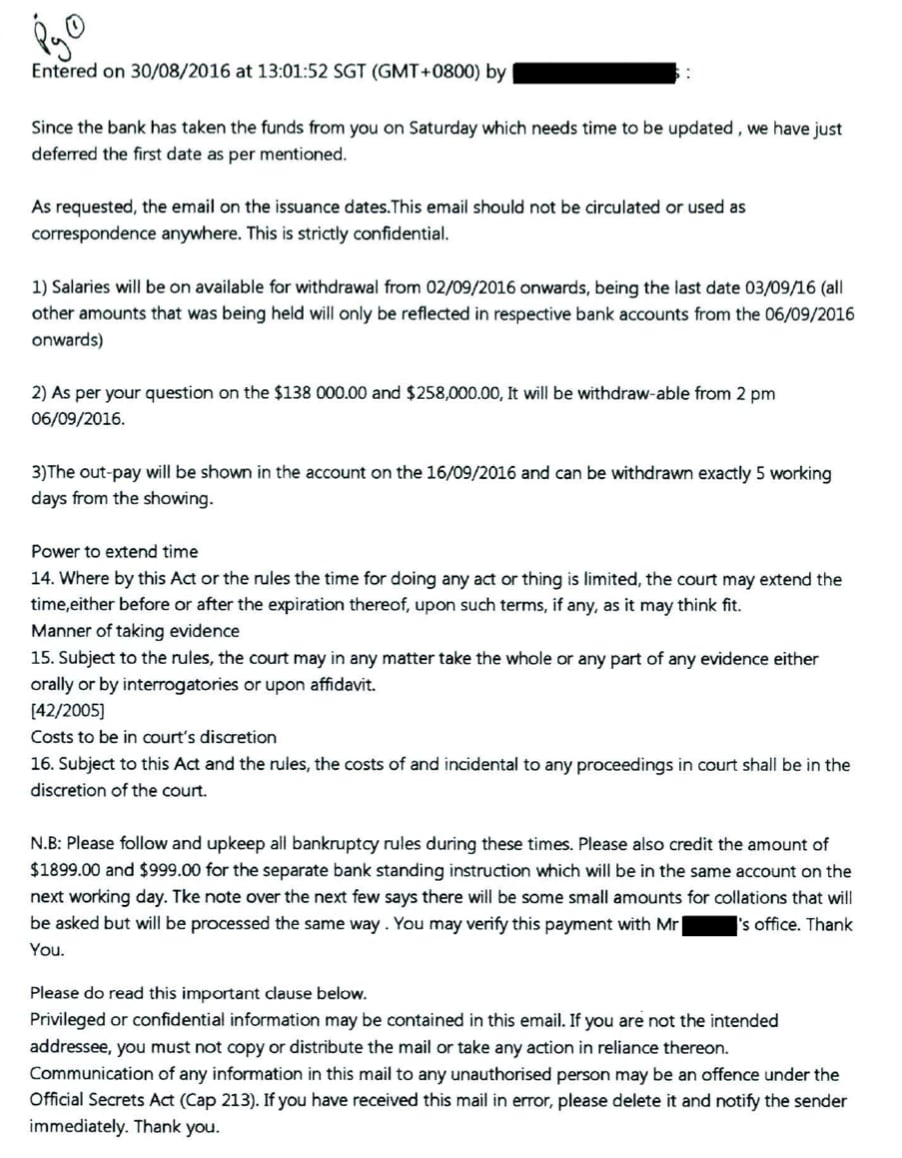How a scammer used forged emails to convince her boss to give her S$3.7 million over 10 years
CNA looks at several emails written by Lynne Charlotte James, who posed as government officials and cheated her boss out of his life savings.
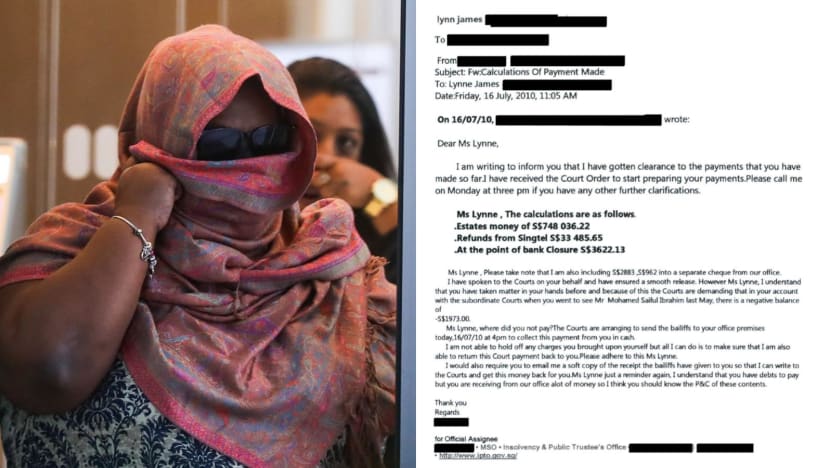
Lynne Charlotte James at the State Courts on Mar 13, 2024, and an email she had forged and shown to her victim. (Images: TODAY/Nuria Ling, State Courts)

This audio is generated by an AI tool.
SINGAPORE: In what a judge called a “heartrending case”, an elderly man lost his life savings and almost lost his wife after his employee at a real estate firm cheated him into handing over nearly S$3.7 million (US$2.8 million).
The employee’s nearly decade-long ruse began in May 2008 and only came to a halt when the victim’s niece caught wind of what was happening and went to the authorities.
Aside from being ruined financially, the victim, who turns 70 later this year, suffered a stroke due to the stress of the case. The man and his wife nearly divorced and currently stay in a rented home, unable to afford even a two-room flat.
The scammer, Lynne Charlotte James, was sentenced to 12 years’ jail last week as her former boss and his wife looked on stoically from the public gallery.
Following the court case, some members of the public questioned how James had duped her victim for so long through hundreds of official-looking but ultimately forged emails.
CNA has obtained copies of seven such emails and one letter that James cooked up, showing how she posed as officials from the Singapore government.
The emails contained the typical boilerplates used by government agencies, complete with URLs and confidentiality warnings under the Official Secrets Act. One email was even made to look like a system-generated message from the Ministry of Law (MinLaw).
Email addresses and certain names were redacted.
On Oct 5, 2009, James had already been running her scam for more than a year when she impersonated an official from the Insolvency and Public Trustee’s Office (IPTO).
She was facing bankruptcy, but told her boss she had become bankrupt and that IPTO had retained funds in her bankruptcy estate. She asked him to help her pay various purported fees to IPTO so that it would release the funds to her.
IPTO falls under MinLaw and oversees the administration of individual and corporate insolvencies.
James wrote an email under the official’s name, making reference in the subject header to an individual insolvency matter and what looked like a legitimate case number.
The email stated that she had to ensure she had sufficient funds of S$2,878 by the end of the day “to ensure the smooth process of your release”.
“I have aided to screen through all your accounts and am pleased to churn out the final payout to you. This figure is the total amount which already includes all the refunds and the overpayment from various departments,” the email read.
“The figure reads at S$748 221.97. We have aided to release your funds within a week starting from the sixth of October.”
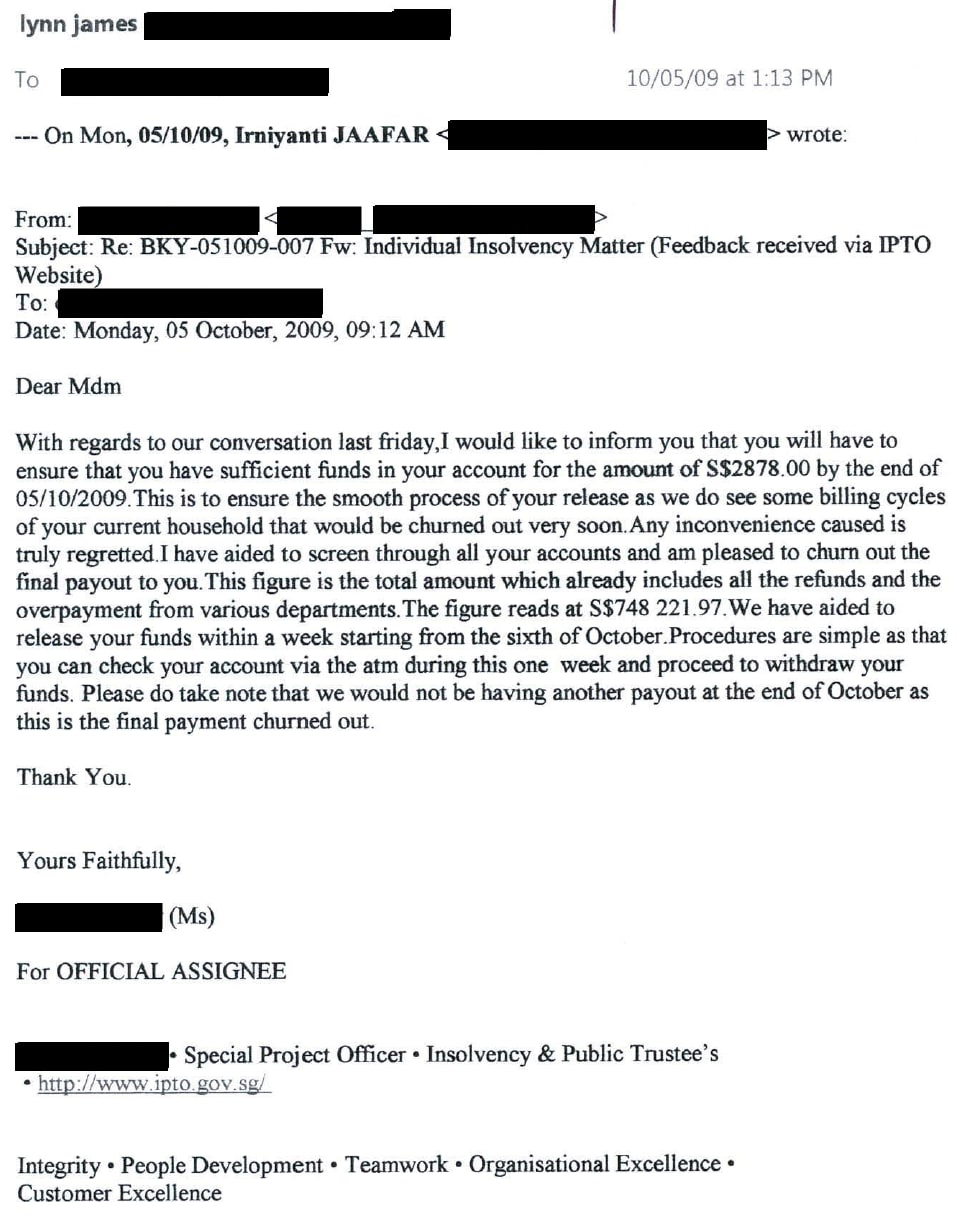
A few months earlier in May, James had forged an email asking her to “furnish administration costs of $S722.45 by 21st June 2009 together with your endorsements”.
According to the email, James’ appeal to release “$S48 000.00” to her designated account as a “first payout” had been approved.
On Jul 16, 2010, James continued impersonating an IPTO official. She provided figures of payments made so far, like “estates money of S$748 036.22” and “refunds from Singtel S$33 485.65”.
Using a smaller-sized font, the purported official said she was including “S$2883 ,S$962” in a separate cheque from “our office”. She then questioned why James had not made another payment and warned that bailiffs were coming to collect it.
“I have spoken to the Courts on your behalf and have ensured a smooth release,” the email continued.
“However Ms Lynne, I understand that you have taken matter in your hands before and because of this the Courts are demanding that in your account with the subordinate Courts when you went to see Mr Mohamed Saiful Ibrahim last May, there is a negative balance of -S$1973.00.
“Ms Lynne, where did you not pay?The Courts are arranging to send the bailiffs to your office premises today,16/07/10 at 4pm to collect this payment from you in cash.”
The purported official also told James to email a soft copy of the bailiffs’ receipt so they could write to the courts and get her money back.
The email further read: “Ms Lynne just a reminder again, I understand that you have debts to pay but you are receiving from our office alot of money so I think you should know the P&C of these contents.”
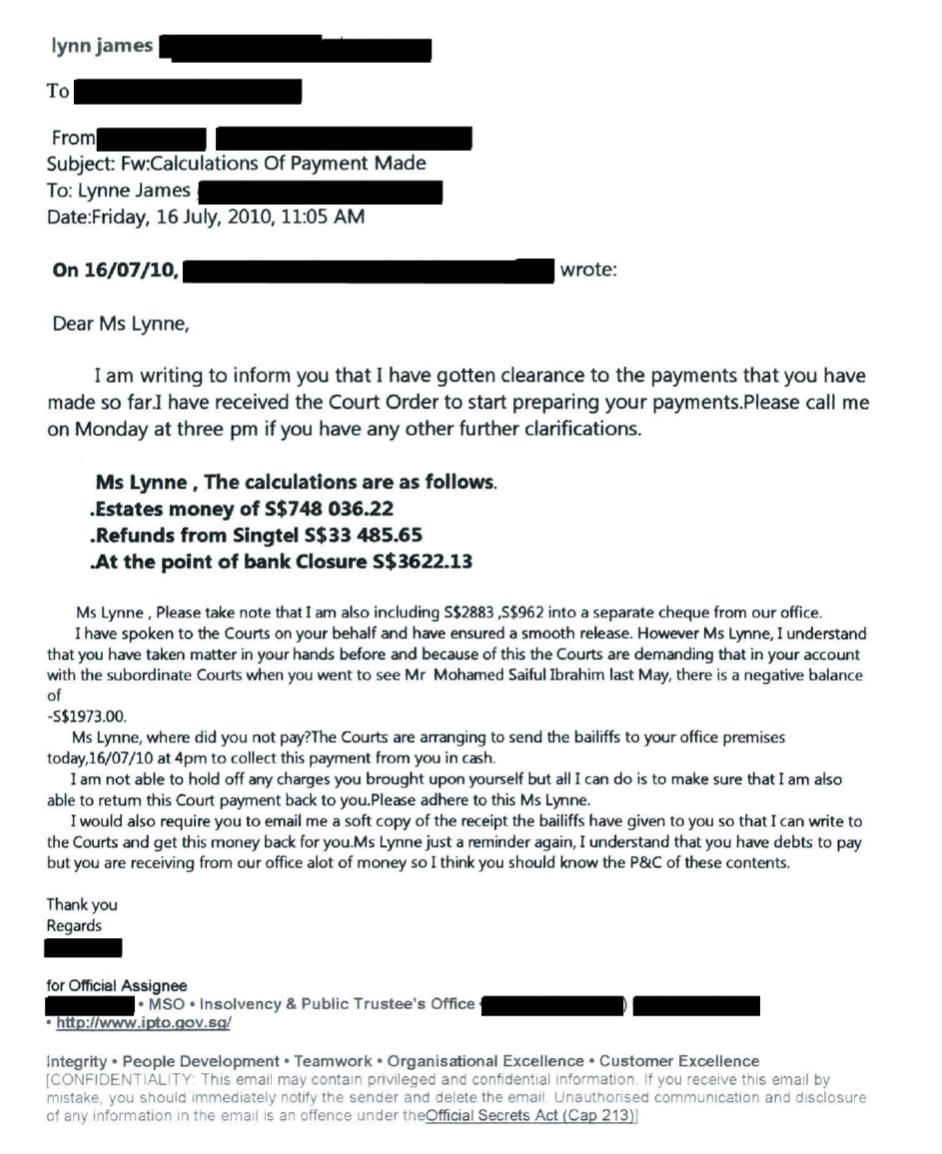
Another email on Apr 18, 2012, originated from “minlaw_agent_runner”, saying that MinLaw had sent her an email with “an attchement that is summoned from the Singapore Subordinate Courts”.
The email also came with a supposed case ID and said James had “successfully logged the above case with us”.
It ended with a footer usually seen in system-generated emails, warning recipients not to reply to the email.
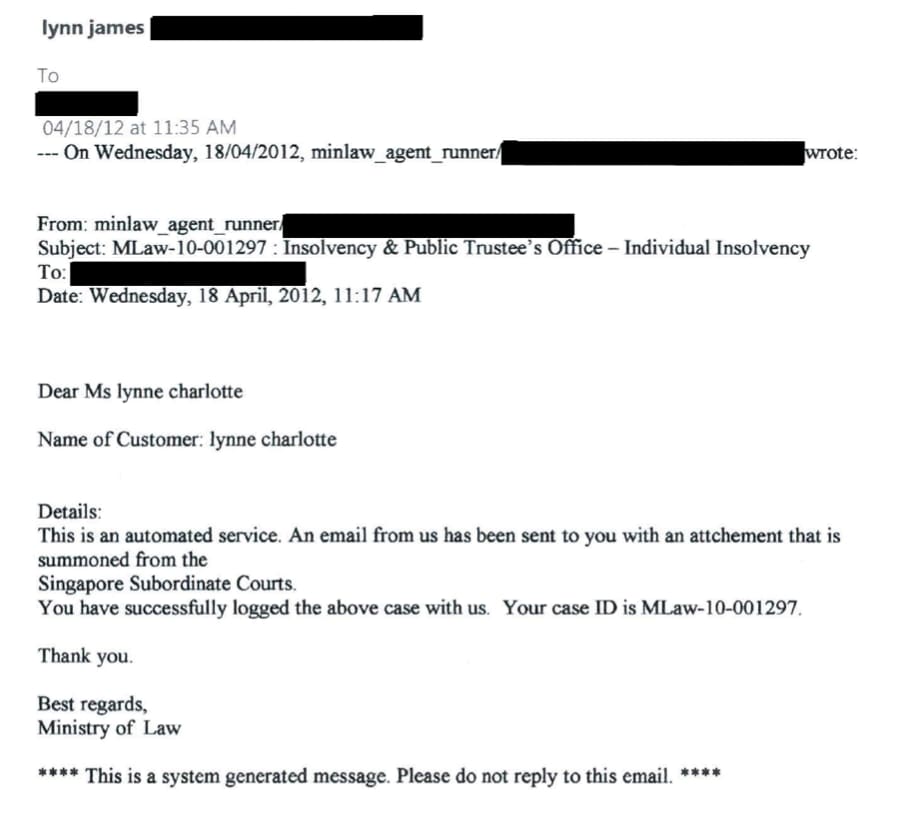
In 2013, James then forged a letter with the stamp of a senior district judge in Singapore. The letter listed several orders given by the judge “after inspecting certain elements into the discharge and release of funds” for her.
These orders included James having to be at 1 Parliament Place – the address of Parliament House – at 3.45pm on Aug 14.
James would also purportedly be receiving a “-$965 256.00 – credit note for presenting to the bank on the 20-08-2013”.
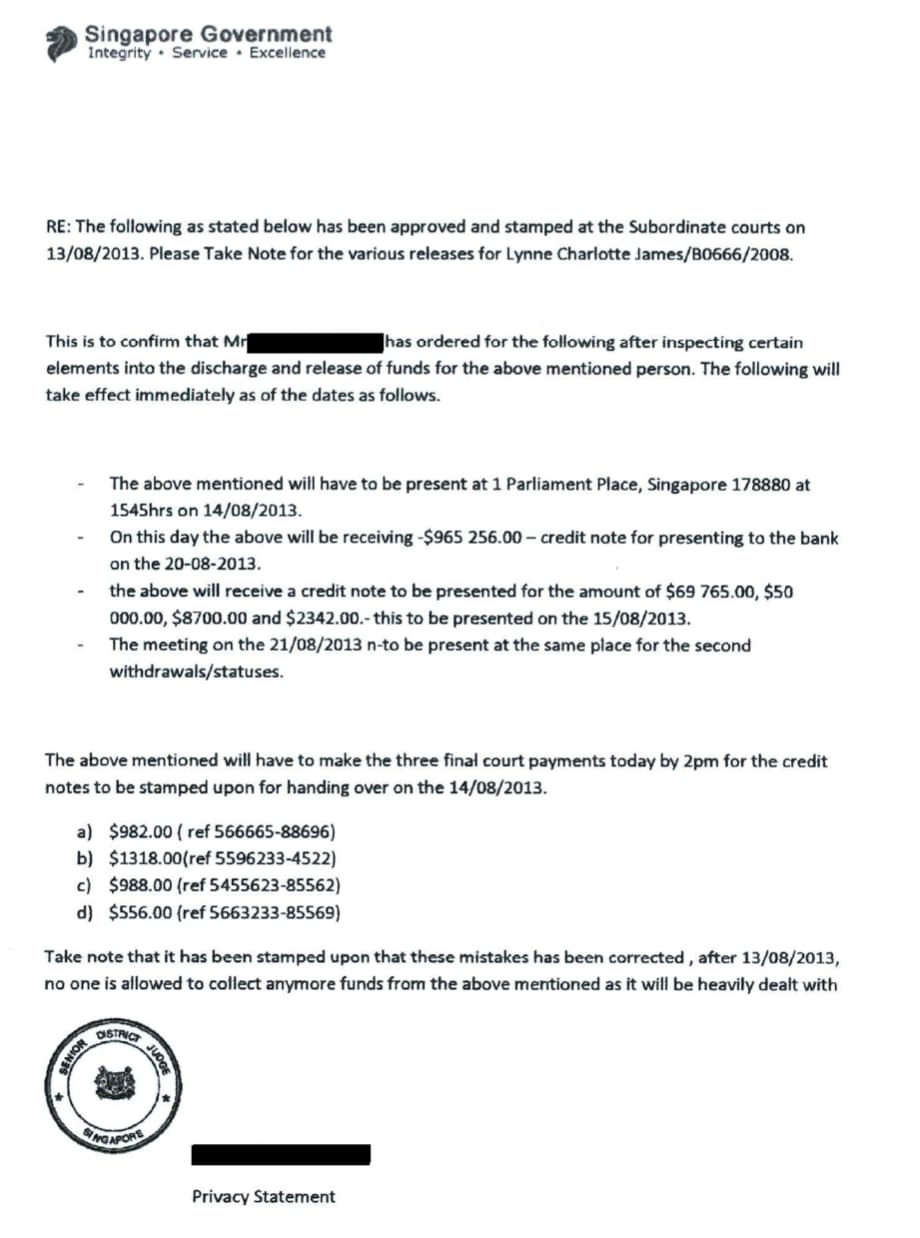
The court previously heard that she had created such fake documents and emails from the Attorney-General’s Chambers and judges such as Chief Justice Sundaresh Menon asking her to continue paying fees to IPTO.
She told the victim that if he stopped paying money, the funds he had already sunk in would be confiscated and he would not be able to get his money back.
She warned him not to report the matter, saying that IPTO would confiscate her funds if they found out he was helping her and he would not be able to get any money back.
This was borne out in an email dated Feb 11, 2015, from another purported IPTO official.
The email stated that someone could be pressurising James “to return what they have helped you”.
It further read: “Madam , remember you are a bankrupt and that those who help you know you are a bankrupt and not allowed to pressure you or belittle you to return the money because knowing your condition, they should await the full discharge. This is why we offer the debt function.”
The purported official listed more payments to be given and added: “I have also consolidated everything so that there would not be any more credits to further traumatise you .”
In a different italicised font, the email stated the penalty that a discharged bankrupt could get if they failed to “give assistance to the Official Assignee”.
An Official Assignee acts as the receiver of a bankrupt person’s estate, and helps them obtain a discharge from bankruptcy.
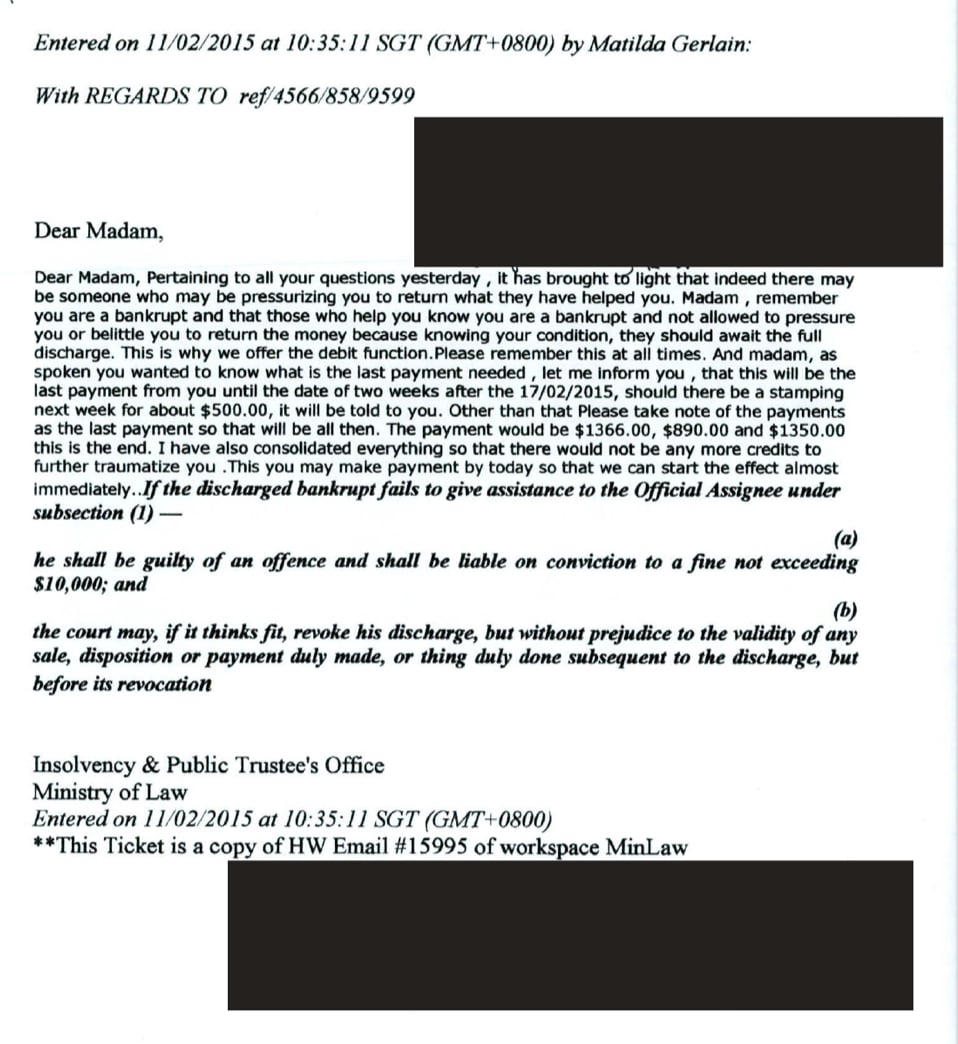
The latest email that CNA obtained was dated Aug 30, 2016.
It told James about salaries being available for withdrawal, and warned her to “follow and upkeep all bankruptcy rules during these times”.
The email included what looked like provisions from the Supreme Court of Judicature Act – specifically on the court’s power to extend time, its manner of taking evidence and how it awards costs at its discretion.
